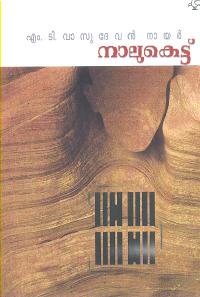#Naalukettu-novel
Naalukettu (novel)
Naalukettu is a Malayalam novel written by M. T. Vasudevan Nair. Published in 1958, it was MT's first major novel. The title attributes to Nālukettu, a traditional ancestral home (Taravad) of a Nair joint family. Like many other novels written by
Read More..
Ratings
Likes
Reviews
None
9 years ago
Admirable novel
This is not a review of the 1959 Sahitya Academy award winning Malayalam novel, but a humble effort to express the beauty of imagination, realism and literature penned by one of the most reverred contemporary Malayalam writers, Sri. M.T Vasudevan Nair. My failure to do justice to the work is accepted and would request others also to excuse me, if anything is wrong in the content below.Before getting into the novel, need to mention that Nalukettu does not mean stone courtyard as some translations suggest. “Nalu” is four(4) and “kettu” is knot/tie/joint in Malayalam. Nalukettu refers to the traditional carpentry construction style where the wooden roof truss of tile thatched buildings are joined at their 4 vertices of a square structure. The join is done without the use of any bonding agent. The style of construction was widely prevalent in Kerala, till wood became a precious commodity and security of the large open courtyard in the middle started posing threats of security. Well, the point is that it’s not “stone courtyard”, but “four joins”.Appunni, the protagonist, lives through his childhood, teenage and being a successful man. Whilst there are so many aspects about the novel that would strike each reader, the phases of life Appunni goes through and the way the reader is taken through him coming to age and understanding the world and life is the underlying current that runs strong through out the length of the story. The story also gives a great view into the socio economic conditions and dominant nature of the family heads at the time. Reading the story from another era, another generation is a look back at how much the same society has evolved. The same issues at that era no longer exist, but we have different, more complex social issues that has taken their place with improved socio economic and civic conditions. The basic premise of a joint family itself has got almost wiped out of the state.Appunni’s father, Konthunni Nair was a fearless, self made and respected man in the village who was killed through treachery by his business partner. He was considered a rebel by the ultra orthodox community and his acts of mingling with people of different castes without any respect to the prevalent restrictions. Appunni’s mother belonged to the wealthy Nair family (Tharavadu), which is the Nalukettu in the story. They married against the wish of her family and hence was considered not part of the family any more. That would mean, Appunni also to be no longer part of the larger family. After Konthunni Nair’s death, mom and son are poverty stricken the once wealthy lady now has to work at the backyard of other houses to run her own. Portrayal of how much ego and false prestige ruled over humanitarian values even when it was closest family in question.Appunni was good in studies and would start going to high school. As he enters his teenage, he gets annoyed at the growing closeness between his mother and Sankaran Nair, an aide at his mother’s work place. This provokes him to leave the home and go to the Tharavadu, where the head of the family (Valiammama) once kicked him out during a family event. Despite the inhuman treatment, he sticks on there and continues his education amidst the hardships. He earned scholarships more than enough to cover his education and expenses. All these days, his grudge towards his mother who has gone to live with another man keeps growing.During this phase, the family itself goes through lot of unrest and demands of division of wealth. Uninterested and fed up of everything, he continues to focus on clearing the 10th standard, so that he can earn a job and get out from there. He faced difficulty in paying the exam fees of 15 rupees. Finally his close friend, Mohammed arranges the amount. It’s only after paying the fee that he comes to know that it was his mother who gave the money to Mohammed. Furious, but he had no choice, but to accept it. Clearing the exams in flying colours, Appunni is in the lookout for a job. He receives a letter from his Father’s old business partner, Seythali, the same man who poisoned and killed his father for money. Seythali asked him to come to Wayanad, where he can arrange a job for Appunni. He quickly packs up and leaves the bounds of his village. Appunni joins the tea estate and works his way up through 5 years to become a field surveyor.Without any prior plans he goes back to his village, with lot of cash and unseen lifestyle for the villagers. A number of people come to meet him now that he’s got a deep pocket, only to listen to his verbal abuse. The Tharavadu is in sad state of affairs and the building itself is mortgaged for loan. The then head of the family (Valiyammama), who denounced Appunni all through his stay there had no much choice, but to beg to Appunni to help regain the Nalukettu, paying off the debt. Appunni buys the house with lion share of his savings through all these years and brings back his Mother and Sankaran nair to stay there. He no more has the grudge. Appunni has grown to become a man who understands all the events that happened in his life and treat each one to it’s merit.Never explicit, the way evolution of Appunni’s thought process is portrayed from being a boy to a man who’s been through the hardships is admirable. There are so many more characters and undercurrents that explains the time and nature of the age in which the events take place.Too long by now, closing off with the knowledge that I might have done sole injustice to the creative genius, but if one person picks up and reads the novel after reading this, I’d consider that Mission accomplished.Originally posted on http://bit.ly/2dfsJRz
 3 Likes
3 Likes
 DisLike
DisLike
Popularity
Ranks
This #hashtag is not ranked yet.

